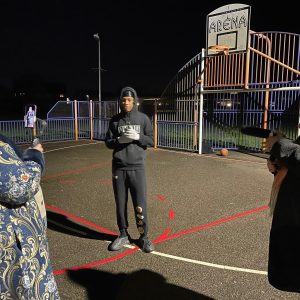Brian Lewis is a vital member of the senior management team at Youth Unity. With a distinguished career in financial management, Brian brings strategic insight and expertise to the organisation’s financial operations. His commitment to excellence and passion for the organisation’s mission drive his efforts to optimise financial resources and support the organisation’s objectives.
Media & Film Making
Unleashing Creativity: Youth Unity’s Media and Film Production Workshops
At Youth Unity, our Media and Film Production Workshops, spearheaded by the visionary Paul McKenzie, serve as transformative platforms for young individuals to explore the world of filmmaking. These workshops are more than just technical sessions; they are a dynamic space where creativity knows no bounds, and voices are amplified.
Paul McKenzie, an instrumental force within Youth Unity, has been dedicated to uniting young individuals and providing them with the essential tools and guidance needed to produce impactful short films.
Through his expertise and mentorship, our workshops go beyond the basics of film production, delving into the heart of storytelling and societal impact.
Harnessing Film for Social Change:
Our programs are designed to educate young people on the incredible power of film as a medium for social change. Participants learn not only the technical aspects of filmmaking but also how to harness the narrative potential of the medium. The workshops inspire young creators to delve into and address pressing societal issues, offering a lens through which they can explore and contribute to meaningful conversations.
Addressing Pressing Societal Issues:
In our workshops, young filmmakers are encouraged to tackle pressing societal issues and concerns that affect both the larger society and their own communities. The goal is to empower them with the skills and confidence to tell stories that matter, stories that have the potential to evoke empathy, understanding, and positive change.
A Creative Community in the Making:
Beyond the technical aspects, our Media and Film Production Workshops foster a sense of community and collaboration. Participants become part of a creative collective, exchanging ideas, learning from one another, and collectively contributing to the art of storytelling. It’s not just about creating films; it’s about nurturing a community of passionate storytellers.
Join the Filmmaking Journey:
If you’re passionate about storytelling, social change, and the transformative power of film, join us at Youth Unity’s Media and Film Production Workshops. Let’s embark on a journey of creativity, exploration, and impact, where young individuals become the architects of change through the art of filmmaking.
Youth Unity Copyright
Case Study: 3
Over the past five months, Youth Unity has had the privilege of working with a young man whose journey has now reached a satisfying conclusion. Initially released from a custodial sentence and facing uncertainty, he lacked a clear direction for his future.
Together, our SYV Mentor tackled each step of the process. From securing accommodation to crafting an impressive CV and job hunting, we left no stone unturned. Fast forward to today, and we are thrilled to share the success story. This young man, now settled in a new area with his partner, he has found employment in a warehouse.
But that’s not all—his passion for physical education is also thriving. He’s balancing his part time job and online work as a PE specialist, showcasing his dedication and resilience.
This closed case is a testament to the power of support, guidance, and hard work.
Here’s to the young man’s success and the promising chapters that lie ahead in his journey!
Help with Bullying
How to Get Help with Bullying
Talk to Someone You Trust:
It’s okay to share your feelings. Talk to a grown-up you trust, like a parent, teacher, or school counselor. They’re there to help.
Know It’s Not Your Fault:
Bullying is never your fault. Remember, you didn’t do anything wrong.
Describe What’s Happening:
Explain what’s going on. Tell them who is involved, where it happens, and what they say or do.
Be Brave and Strong:
It’s important to be brave and stand up for yourself. You can say things like, “Stop!” or “I don’t like that.” If you don’t feel safe, it’s okay to walk away.
Stay with Friends:
Being with friends can help you feel safer and happier. They can support you.
Online Safety:
If the bullying happens online, block or report the person. Don’t share personal info and remember that you can always talk to a grown-up about it.
Keep a Bullying Diary:
Write down what happens, when it happens, and who’s involved. It helps grown-ups understand and help.
Be a Good Friend:
Be kind and make friends with others. Being a good friend is cool, and it can stop bullies
Stay Strong:
You are strong, and you can get through this. Believe in yourself, and know that things will get better.
Love and Support:
Your family loves you, and they’re there to support you. You’re never alone, and they will help you.
Remember, talking to someone you trust is the most important step. You don’t have to face bullying on your own. We care about you, and we want to help.
Mental Health, challenges in a post covid world
Coping with mental health challenges during and after the COVID-19 pandemic has been a significant concern for young people, including those under the age of 16, in London and around the world. The impact of the pandemic on young people’s mental health can vary widely, but several common themes have emerged:
Social Isolation: Lockdowns and social distancing measures have led to social isolation, which can be particularly challenging for young people. The lack of in-person social interactions with peers and teachers has been a source of stress and loneliness.
Disrupted Education: The closure of schools and the shift to remote learning have disrupted the educational routines of young people. This change can lead to increased stress, anxiety, and feelings of uncertainty about their academic progress.
Family Stress: The pandemic has brought about financial and emotional stress in many households. Young people may be affected by family issues, such as job loss, illness, or strained relationships.
Fear and Uncertainty: The uncertainty surrounding the pandemic, including concerns about personal and family health, can contribute to anxiety and stress in young people.
Digital Overload: Increased screen time due to remote learning, socializing, and entertainment can lead to digital fatigue and potential mental health challenges.
Access to Mental Health Services: Access to mental health services has been disrupted for some young people, leading to difficulties in seeking support.
To address these challenges, various organisation’s, schools, and healthcare providers in London have taken steps to support the mental health of young people:
Schools have been providing mental health and well-being resources, counselling, and support to students. They have also adapted their teaching methods to better address emotional and social needs.
Online Resources: Many organisations and mental health services have offered online resources and virtual counselling to ensure young people can access support from home.
Community Programs: Community organisations and youth centres have developed programs to engage young people and promote social connections.
Parental Support: Encouraging open communication between parents and young people is crucial. Parents can provide a supportive environment for discussing emotions and stressors.
Government Initiatives: The government and local authorities in London have implemented initiatives to support the mental health of young people and their families during and after the pandemic.
It’s essential for parents, teachers, and caregivers to remain vigilant and provide a safe space for young people to express their feelings and seek help when needed. If you or someone you know is struggling with mental health issues, it is advisable to reach out to mental health professionals or organisations that can provide the necessary support and resources. Additionally, it’s important to stay informed about the latest local mental health services and resources available in London.
In London, there are various resources available to support young people dealing with mental health challenges. Here are some organisations, helplines, and services that can provide assistance and guidance:
YoungMinds: YoungMinds is a UK-based charity that focuses on improving the mental health and emotional well-being of young people. They offer resources, information, and a helpline for young people and their families. Visit their website at YoungMinds.
Child and Adolescent Mental Health Services (CAMHS): CAMHS provides mental health support for children and young people in the UK. They offer assessments, treatments, and therapies. Referrals to CAMHS are typically made through a GP or school.
Kooth: Kooth is an online mental health platform for young people in the UK. It offers free, anonymous counseling and emotional support. You can access Kooth at Kooth.
MIND: offers a range of mental health services, including youth well-being services. They provide support for young people through various programs and resources.
Samaritans: While not specific to young people, Samaritans provides a 24/7 helpline for individuals in distress. You can call them at 116 123 (free from any phone) or visit their website at Samaritans.
Shout: Shout is a crisis text line available 24/7 for people in crisis. While not exclusive to young people, it can be a helpful resource. Text “SHOUT” to 85258 to connect with a trained crisis volunteer.
Off the Record: Off the Record provides mental health support to young people in South London. They offer counseling, workshops, and online resources. Visit their website at Off the Record.
Anna Freud Centre: The Anna Freud Centre offers a wide range of resources and services for children and young people’s mental health. They provide information, training, and support. Visit their website at Anna Freud Centre.
Local NHS Services: Many London boroughs have specific NHS services for child and adolescent mental health. You can inquire about these services through your GP or local healthcare provider
Local Support Services: Depending on the specific area within London, there may be local support services, youth centers, and community organizations that provide mental health support. It’s worth checking with your local council for information on these resources.
It’s important to remember that reaching out for support is a positive step, and there are professionals and organizations in London dedicated to helping young people with their mental health challenges. If you or someone you know is in crisis or requires immediate help, please contact emergency services or go to the nearest hospital.
Vaping, do you know what it is doing?
Vaping, or the use of electronic cigarettes (e-cigarettes), has become a growing concern, particularly among young people. The dangers associated with vaping in young people include:
Nicotine Addiction: Many e-cigarettes contain nicotine, which is highly addictive. Young people who start vaping may develop a dependence on nicotine, leading to cravings and withdrawal symptoms when they try to quit.
Brain Development: Adolescence is a critical period for brain development, and nicotine exposure during this time can have long-lasting effects on cognitive and emotional functions. It can impair memory, attention, and impulse control.
Respiratory Issues: Vaping can cause lung problems and increase the risk of respiratory illnesses. Cases of severe lung injury related to vaping have been reported, especially in those who use e-cigarettes with illicit or contaminated substances.
Gateway to Smoking: There’s a concern that vaping may serve as a gateway to traditional cigarette smoking. Young people who start with e-cigarettes may be more likely to transition to smoking conventional cigarettes.
Unknown Long-Term Health Effects: E-cigarettes are relatively new, and their long-term health effects are still being studied. There may be risks and consequences associated with vaping that are not yet fully understood.
In the UK, the law and regulations regarding vaping have evolved over the years to address these concerns and ensure the safety of young people. As of my last knowledge update in September 2021, the key laws and regulations related to vaping in the UK were as follows:
Age Restrictions: In the UK, it is illegal to sell e-cigarettes and vaping products to anyone under the age of 18.
Advertising Restrictions: Advertising of e-cigarettes is subject to strict regulations. It should not appeal to young people, and it must not make health claims that are not supported by evidence.
Product Safety: E-cigarette products must meet safety and quality standards. They should not contain harmful substances beyond specified limits.
Tank Size Limits: There are restrictions on the size of e-cigarette tanks to prevent excessive nicotine intake.
Notification to Regulators: Manufacturers and sellers of e-cigarettes must notify regulators about the products they intend to sell.
Packaging and Labeling: Vaping products must be adequately labeled with health warnings, and packaging should be child-resistant.
It’s important to note that regulations may have evolved since my last update in 2021. The UK government and health organizations continue to monitor and assess the impact of vaping and may implement further changes to protect public health, especially among young people. If you want to stay up-to-date with the latest vaping laws and regulations in the UK, it’s advisable to refer to official government sources or consult with relevant health authorities.
Do you understand Cannabis
Smoking cannabis, especially at a young age, can pose various risks and dangers to one’s physical and mental health. It’s important to note that the effects and risks of cannabis can vary depending on factors such as the individual’s age, frequency of use, the potency of the cannabis, and their overall health. Here are some potential dangers for young people smoking cannabis:
Impaired cognitive development: The brain continues to develop well into a person’s mid-20s, and cannabis use during this period can negatively impact cognitive functions, such as memory, attention, and learning. This is a particular concern for adolescents and young adults.
Mental health issues: Some individuals, especially those with a predisposition to mental health conditions,
may experience increased risk of anxiety, depression, and even psychotic disorders like schizophrenia with heavy cannabis use, particularly when initiated at a young age.
Dependency and addiction: While cannabis is not as physically addictive as substances like nicotine or opioids, some individuals can become psychologically dependent on it, leading to impaired daily functioning and difficulty quitting.
Academic and occupational problems: Regular cannabis use can result in poor school or work performance, decreased motivation, and difficulties in meeting responsibilities.
Risky behaviours: Cannabis can impair judgment and coordination, increasing the likelihood of engaging in risky behaviors, such as driving under the influence, unprotected sex, or other unsafe activities.
Lung problems: Smoking cannabis, like smoking tobacco, can have adverse effects on lung health. Inhaling the smoke can lead to chronic bronchitis and lung infections.
Decreased educational and career opportunities: Some employers and educational institutions have strict drug policies, and a positive drug test for cannabis could result in missed opportunities.
Legal consequences: In many places, cannabis is still illegal for recreational use, and young people may face legal consequences if caught using or possessing it.
Reduced life satisfaction: Excessive cannabis use can lead to social isolation, lower quality of life, and a decreased sense of well-being.
Risk of exposure to contaminants: In regions where cannabis is not regulated or from unverified sources, there may be risks associated with consuming contaminated or adulterated products.
Tolerance and escalating use: Over time, individuals may develop a tolerance to the effects of cannabis, which can lead to using higher doses, making it more challenging to control usage.
It’s important for young people to be aware of these potential dangers and make informed decisions regarding cannabis use. If a young person is struggling with cannabis use or experiencing negative consequences, it’s essential to seek help from a healthcare professional or counselor who can provide guidance and support. Additionally, education and open communication between parents, caregivers, and young people are crucial for addressing these risks and promoting responsible decision-making.
Drug addiction: getting help
If you need treatment for drug addiction, you’re entitled to NHS care in the same way as anyone else who has a health problem.
With the right help and support, it’s possible for you to get drug free and stay that way.
Where to get help for drugs
A GP is a good place to start. They can discuss your problems with you and get you into treatment.
They may offer you treatment at the practice or refer you to your local drug service.
If you’re not comfortable talking to a GP, you can approach your local drug treatment service yourself.
Visit the Frank website to find support near you.
If you’re having trouble finding the right sort of help, call the Frank drugs helpline on 0300 123 6600. They can talk you through all your options.
Charity and private drugs treatment
As well as the NHS, there are charities and private drug and alcohol treatment organisations that can help you.
Visit the Adfam website page, Finding Support, to see a list of useful organisations.
Private drug treatment can be very expensive, but sometimes people get referrals through their local NHS.
Ambition Project, work with Folkestone & Hythe Council to empower young people

The Ambition Project is designed to help young people develop a set of life skills to help them engage and showcase their best possible selves. It sets out to assist young people to lead more fulfilled lives and progress in education and their own personal development pathway. It will also assist to enhance the relationship with themselves and others.
Learning modules will include:
Developing confidence and self esteem
Don’t beat yourself up! Learning about self-handicapping behaviour
Consequential thinking – Your choice, Your future
Controlling your impulses – choice points, long term benefit v short term gains
Make it happen – raising your standards, dealing with failure, change requires action.
Detached Youth Work on
the Percy King Estate, Clacton


Youth Outreach work in the community.
Youth Unity outreach service functions as a secure haven catering to the needs of young individuals and is conveniently situated on Percy King Estate, Langham Drive, Clacton-on-Sea.
Every Tuesday 3pm to 6.30pm – FREE to attend all ages are welcome, both boys and girls.
Its central focus centres on involving young people all aimed at fostering a robust sense of community among the youth. We encourage sports, we found a game of football is always appreciated, but we cater for all, and tend to let the young people decide on the activity of the week.
In close partnership with Essex Council for Voluntary Youth Services.
Our primary objective is to establish a secure and welcoming space within the community, providing an opportunity for the community to unite and gain a deeper understanding of the youth and their requirements. Often, young people find themselves without guidance or suitable destinations, and Youth Unity is dedicated to offering prospects and directing them to other engaging activities.
Our goal is to provide valuable direction and advice by pointing towards various activities within the local vicinity. Additionally, we extend assistance and guidance on topics that hold significance for both young individuals and parents.






Nick Darvill
Consultant
With an impressive 40 years of experience within the criminal justice system, Nick brings an unparalleled wealth of knowledge in working with young offenders, victims of crime, and families impacted by violent acts. His recent collaboration with The Rob Knox Foundation highlights his commitment to raising awareness about the far-reaching consequences of knife crime.
Nick’s services are dedicated to providing essential guidance and support to young individuals, empowering them to reduce their vulnerability and develop confidence and resilience. Notably, he spent six years leading and expanding the crime reduction program at the esteemed Charlton Athletic Community Trust. This groundbreaking role was the first of its kind in The Premier and Football Leagues, pioneering innovative approaches to engage with hard-to-reach young people within the realm of professional football clubs. Nick has successfully managed and led intervention programs funded by The Football Foundation and Premier League Charitable Fund, demonstrating his expertise in designing effective initiatives. His services have also been sought by The Premier League Kicks management board and MOPAC (Mayor’s Office for Policing & Crime).
As a member of the award-winning Kickz Management Team, a collaboration between The Football Foundation and Metropolitan Police Service, Nick’s specialised skills in working with at-risk youth were instrumental in enhancing the delivery of this football-based diversionary project. His qualifications include holding the UEFA ‘A’ Football Coaching Licence and being an active member of the FA Coaches Association. With an extensive coaching background at West Ham United and Charlton Athletic Youth, Nick brings a comprehensive skill set to his endeavors.
Overall, Nick’s vast experience, unique partnerships, and commitment to making a difference position him as an invaluable asset in tackling youth-related challenges and promoting positive change within the community.


















